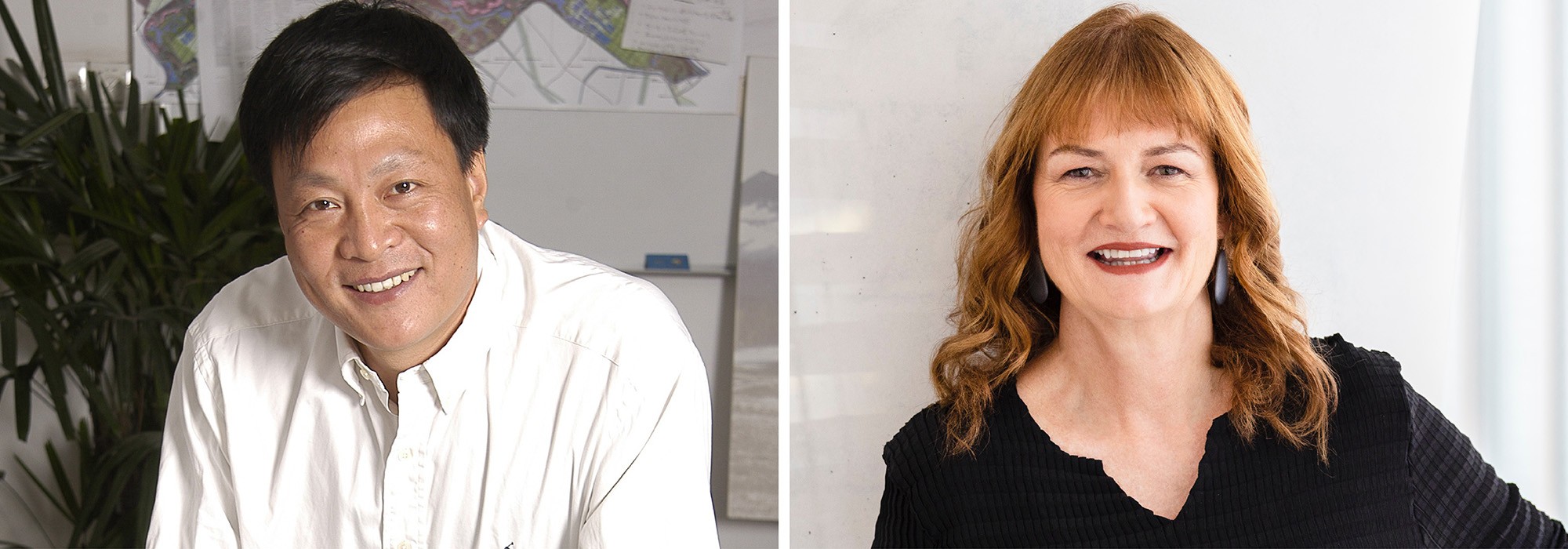The Chinese landscape architect Kongjian Yu, winner of the 2023 Cornelia Hahn Oberlander International Landscape Architecture Prize, is a globally recognized champion of the “sponge cities” concept. The premise of the “sponge cities” concept is simple – to deal with climate change accelerated urban flooding, absorb the water with constructed wetlands rather than channeling it with concrete dams and other conventional engineering solutions. In an inspiring and insightful conversation with the landscape architect and Oberlander Prize Jury Chair, Elizabeth Mossop, Yu will discuss the evolution of this idea that he incubated while getting his doctorate at the Harvard University Graduate School of Design (1992-95), to its adoption as national policy in China in 2013, and subsequent implementation in dozens of Chinese cities.
Significantly, Yu’s design philosophy and concepts interweave nature and culture and are committed to design excellence. Setting aside land in and around cities for public space and water collection and infiltration, the “sponge cities” concept deploys natural processes as green infrastructure, retaining water on-site in lakes, wetlands, and cisterns. These constructed ecosystems slow water flow and make wise use of nature’s free services to clean the water, restore habitats for greater biodiversity, and create productive and pleasant places for people. Raised in rural China, Yu was inspired by traditional adaptations to the monsoon climate, recognizing them as a model for local solutions that can be scaled up for climate change mitigation around the world. Yu and his firm Turenscape have tested the concept in more than 600 projects in more than 200 cities.
The conversation between Mossop and Yu will be followed by a Q&A with event attendees, among them Oberlander Prize jurors Consuelo Bravo (Chile) and Leonard Ng (Singapore).
Elizabeth Mossop
Professor Elizabeth Mossop is Dean of the University of Technology Sydney (UTS) School of Design, Architecture and Building and a landscape architect and urbanist with wide-ranging experience in both landscape design and urban planning. Elizabeth is a founding principal of Spackman Mossop & Michaels landscape architects based in Sydney, Australia, and New Orleans, LA. With an academic career spanning 25 years, Elizabeth has held key roles at universities in both the United States and Australia. Before joining UTS, she was Professor of Landscape Architecture and Director of the Robert Reich School of Landscape Architecture at Louisiana State University, one of the highest ranked landscape architecture programs in the United States. Previously, she was the Director of the Master of Landscape Architecture program at the Harvard Graduate School of Design.
Kongjian Yu
Kongjian Yu, the 2023 winner of the Cornelia Hahn Oberlander International Landscape Architecture Prize, is a Chinese landscape architect who founded and leads the Graduate School of Landscape Architecture, and the College of Architecture and Landscape Architecture at Peking University. He is also founder and principal designer at the Beijing-based landscape architecture firm Turenscape. Yu received a Doctor of Design Degree from the Harvard University Graduate School of Design (1995) during which time he developed the landscape architecture concept now known as “sponge cities” for mitigating urban flooding. The “sponge cities” concept addresses climate change accelerated urban flooding with large-scale nature-based infrastructure – including constructed wetlands, greenways, parks, canopy tree and woodland protection, rain gardens, green roofs, permeable pavements, bioswales, other measures – that acts as sponges soaking up and storing rainfall instead of relying exclusively on traditional concrete reinforced riverbanks, dams, pipes, drains, and other conventional engineering solutions. The “sponge cities” concept was adopted as national policy in China in 2013 and has been deployed in dozens of Chinese cities with the goal that by 2030 80% of the cities would be able to absorb 70% of their rainfall.
Yu is the author of more than twenty books and the founder and chief editor of internationally awarded magazine Landscape Architecture Frontier. He has been an invited lecturer, speaker, and guest professor around the world; he and his firm’s projects have received numerous awards. To date Yu and his firm have some 600 built projects in more than 200 cities, principally in China, but also in France, Indonesia, Russia, Singapore, Thailand, and the U.S. The “sponge cities” concept is being adopted in countries around the world from India (where fifteen new projects have been commissioned) to Ireland, and many others.
1.0 LA CES™ professional development hours will be available to attendees.
